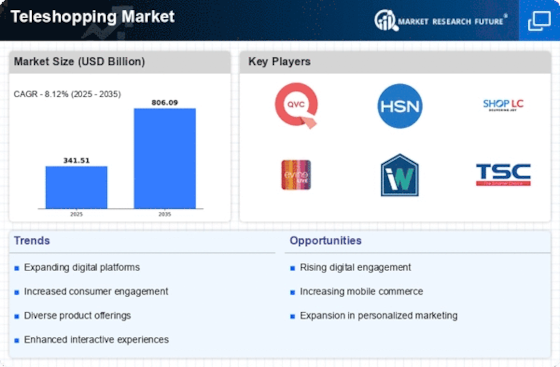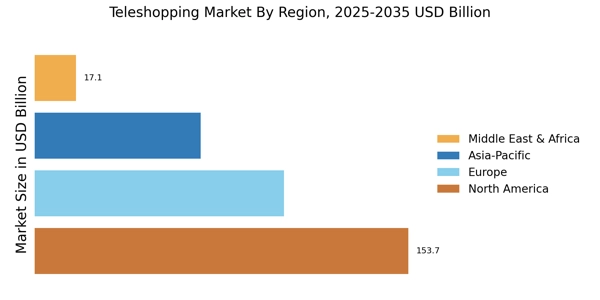Rise of Mobile Shopping
The proliferation of smartphones and mobile devices is significantly impacting the Teleshopping Market. As of 2025, mobile shopping accounts for nearly 50% of all online purchases, indicating a substantial shift towards mobile-centric shopping experiences. Teleshopping Market platforms are increasingly optimizing their services for mobile users, ensuring that consumers can easily browse and purchase products on-the-go. This trend is particularly relevant as younger consumers, who are more likely to use mobile devices for shopping, continue to dominate the market. The Teleshopping Market is thus adapting to this mobile-first approach, which may enhance customer engagement and drive sales. Furthermore, the integration of mobile payment solutions is streamlining the purchasing process, making it more convenient for consumers to complete transactions. This evolution in shopping behavior presents a significant opportunity for growth within the teleshopping sector.
Changing Consumer Behavior
The Teleshopping Market is witnessing a shift in consumer behavior, with an increasing number of individuals preferring the convenience of shopping from home. This trend is driven by busy lifestyles and the desire for instant gratification. Recent data indicates that approximately 70% of consumers now favor online shopping options, including teleshopping, over traditional retail experiences. This change is particularly pronounced among millennials and Gen Z, who are more inclined to engage with teleshopping platforms that offer seamless purchasing processes and quick delivery options. As a result, teleshopping channels are adapting their strategies to cater to these evolving preferences, focusing on user-friendly interfaces and personalized marketing. The Teleshopping Market is thus positioned to capitalize on this behavioral shift, potentially leading to increased market share and profitability.
Expansion of Product Offerings
The Teleshopping Market is diversifying its product offerings to cater to a wider audience. This expansion includes not only traditional categories such as home goods and beauty products but also niche markets like health and wellness, technology, and sustainable products. As of 2025, it is estimated that teleshopping channels are introducing an average of 20 new product lines each month, reflecting a growing demand for variety among consumers. This strategy not only attracts new customers but also encourages repeat purchases from existing ones. By continuously refreshing their product catalogs, teleshopping platforms can maintain consumer interest and engagement. The Teleshopping Market, therefore, is likely to see sustained growth as it adapts to changing consumer preferences and expands its reach into new market segments.
Influence of Celebrity Endorsements
Celebrity endorsements are playing a pivotal role in shaping the Teleshopping Market. The association of well-known personalities with products can significantly enhance brand visibility and consumer trust. Recent studies suggest that products endorsed by celebrities can experience up to a 30% increase in sales compared to those without such endorsements. This trend is particularly effective in the teleshopping sector, where the personal connection between the host and the audience can lead to higher conversion rates. As teleshopping channels increasingly collaborate with influencers and celebrities, they are likely to attract a broader audience and enhance their market presence. The Teleshopping Market, therefore, stands to gain from these strategic partnerships, as they not only boost sales but also foster brand loyalty among consumers.
Technological Advancements in Broadcasting
The Teleshopping Market is experiencing a notable transformation due to advancements in broadcasting technology. Enhanced picture quality, high-definition video, and interactive features are becoming standard, allowing consumers to engage more effectively with products. The integration of augmented reality and virtual reality into teleshopping platforms is also emerging, providing immersive shopping experiences. As of 2025, it is estimated that over 60% of teleshopping channels are utilizing these technologies, which could potentially increase viewer engagement and sales conversion rates. This technological evolution not only attracts a younger demographic but also retains existing customers by offering them innovative ways to shop from home. The Teleshopping Market, therefore, stands to benefit significantly from these advancements, as they create a more dynamic and appealing shopping environment.


















